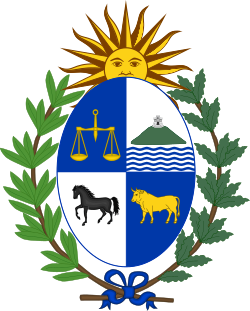Angola–Uruguay relations
Angola–Uruguay relations refers to the current and historical relations between the Republic of Angola and the Oriental Republic of Uruguay. Both nations are members of the Group of 77 and the United Nations.
 | |
Angola |
Uruguay |
|---|---|
History
Angola and Uruguay established diplomatic relations on 26 March 1988.[1] Initial relations between both nations were limited and took place mainly at the United Nations and through South–South cooperation.
In 2014, Uruguay opened its first resident embassy in Luanda.[2] The decision to open the embassy was to strengthen the bilateral relations that have deepened in the last decade driven by the mutual interest shown by both governments and since the establishment of some Angolan direct investments in the production sector of Uruguay.[2] In January 2017, Angola opened a consulate-general in Montevideo.[3]
In February 2019 Uruguayan Foreign Minister, Rodolfo Nin Novoa, paid a visit to Angola.[4] During his visit, Foreign Minister Novoa met with Angolan President João Lourenço and both nations signed numerous bilateral agreements and discussed business and the increase of investments between both nations.[4]
Bilateral agreements
Both nations have signed several agreements such as an Agreement between the Ministry of Agriculture and Rural Development of Angola and the Ministry of Livestock, Agriculture and Fisheries of Uruguay (2002); Agreement between the Institute of Agricultural and Veterinary Research of Angola and the National Agricultural Research Institute of Uruguay (2002); Agreement on Economic, Scientific, Technical and Cultural cooperation (2003); Memorandum of Understanding for the establishment of political consultations (2008); Agreement on the suppression of visas in diplomatic, official and service passports (2013); Agreement for the training of personnel between the Eduardo dos Santos Foundation (FESA) and the University of Uruguay (2017); Agreement for visa facilitation (2019); Agreement on customs cooperation (2019) and a Memorandum of Understanding for Cooperation between both nations diplomatic academies (2019).[3][4]
Resident diplomatic missions
- Angola is accredited to Uruguay from its embassy in Brasília, Brazil and has a consulate-general in Montevideo.[5]
- Uruguay has an embassy in Luanda.
References
- Angola y Uruguay reconocen progresos en la cooperación (in Spanish)
- Uruguay abre embajada en Angola en plan de profundizar relaciones con África subsahariana (in Spanish)
- Angola: Embajador de Uruguay preconiza nueva era en relaciones con Angola (in Spanish)
- Uruguay y Angola exploran oportunidades de negocios, inversión y complementariedad económica (in Spanish)
- Consulate-General of Angola in Montevideo
